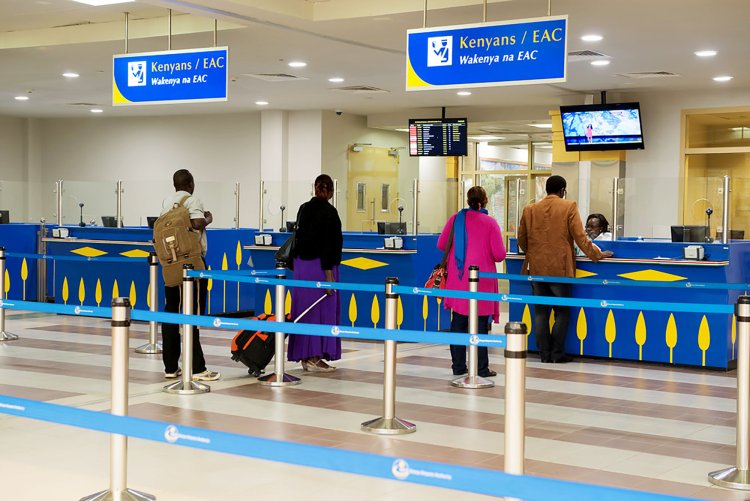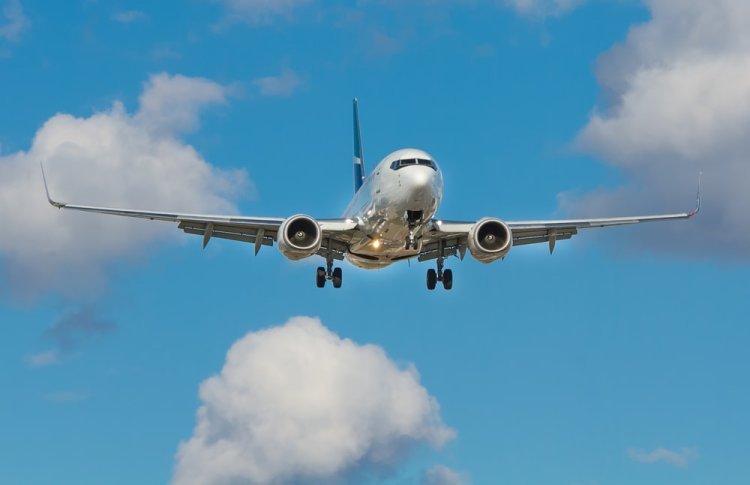Kenyans Share Harrowing Tales Of Going Through JKIA Customs
The number of personal effects seized from Kenyans re-entering the country via JKIA continues to rise even as the Kenya Revenue Authority (KRA) heightens its purge on tax evasion.

UPDATE: The Kenya Revenue Authority (KRA) has announced regulations for all goods whether new or used, which are subject to taxation, including household items above $500 (Ksh75,300) at the airport.
"Passengers have a concession of USD 500 applicable only to goods for personal and/or household use. Passengers are also exempt from their used personal effects," stated KRA in part.
With Kenya approaching the festive season where those living abroad are anticipated to fly back home, an influx in passengers either completing their journeys at Jomo Kenyatta International Airport (JKIA) in Nairobi or proceeding on to other regional destinations is on the horizon.
While many expect the process from disembarking a flight at the country's biggest airport to catching a taxi or ride organised by family and friends to be easy, this isn't always the case because Kenyans have to go through what is termed the biggest monster at international arrivals; the Customs and Border Control section.
The number of personal effects seized from Kenyans re-entering the country via JKIA continues to rise even as the Kenya Revenue Authority (KRA) heightens its purge on tax evasion.
On Monday, October 30, one Maxwell Otieno took to X (formerly Twitter) to warn Kenyans flying into the country through JKIA on carrying electronics from abroad.

JKIA's international arrivals terminal. /NAIROBI NEWS
"If you are coming to Kenya via JKIA please don't carry electronics. Either you pay 63% of the market value or leave the item. I've seen guys crying in the arrivals section. Imagine being charged 150k," he wrote.
His post sparked a flood of reactions from Kenyans lamenting how they were subjected to punitive measures by KRA officers stationed at the airport which is worse than regulations at other world airports.
Natasha Kimani, a public policy and governance advocate, narrated how the customs officials go to the extent of charging passengers for bringing in more than one bottle of perfume or alcohol, even with duty-free products.
"Apparently duty-free products bought abroad don’t apply here- we must still pay tax. An extremely unnecessary and hostile experience," she slammed.
Despite a user responding by stating that there is a 250ml limit for perfume imposed per person, Kimani stated "Actually they now say anything over 100ml for perfume is taxable now, even if duty-free and anything over 1L of alcohol. You can only have 1 100ml of perfume and not 250ml".
Another user complained that he was forced to boot up his one-year-old work laptop that he had travelled with to prove it was his and it was used, creating tension among foreigners arriving at the airport with the dread that they would be met with the same fate.
Heydar Suleiman went on to reveal that a customs officer had compelled him to pay taxes for his new clothes.
"Not just electronics. Last night, upon searching in one of my suitcases, an officer asked me to pay taxes for my new clothes. Just months ago, I arrived through Beirut, Jeddah and Addis, and it was at JKIA that passengers were asked for a Covid cert," he disclosed.
"I once saw those vultures descend upon a Kenyan-Somali family with so much aggression because they had a lot of luggage that had stuff they were bringing in from the US.
"Even the armed guys at the exit started to draw closer. They didn’t scan any of our bags as their focus shifted to that family. It’s been happening for years!" Jelani MK weighed in.
George Njoroge, the Group Managing Director and Chief Executive Officer at East African Data Handlers shared details of a conversation with a friend who works at the Kenya Civil Aviation Authority (KCAA) about how unsuspecting tourists are being cornered into paying exorbitant customs fees for mere possession of new-looking gadgets.
This was corroborated by an immigration official who spoke to Viral Tea, revealing how electronics such as iPhones known to cost hundreds of thousands of shillings in Kenya happen to be targets of punitive customs fees particularly when they are new and unused.
How To Avoid Exorbitant KRA Customs Fees
Nesh Maina, a photographer, shared hacks travellers can make use of to avoid being forced to cough up so much money at the customs desks for electronics while going through the airport.
"Unbox your new electronics before you arrive at JKIA international arrival terminals. By unboxing I mean do not carry with you that iPhone box or MacBook box you bought it with. Also, switch it on. It will help. Put the new phones in your pocket, not your carry-on luggage.
"Of importance to note that I was not aware of are items you should declare before travelling outside including Cameras, Items exported for repair, Toolboxes you require for repair work abroad, Jewelry, Sporting equipment, Musical instruments and any item intended to be returned to Kenya," he posted.

A passenger aircraft landing at an airport. /FILE
Furthermore, all passengers are subject to make declarations to the Customs Officer using the Passenger Declaration Form (Form F88). According to KRA, the following items must be declared upon your arrival at the point of entry:
- Items you purchase for business promotion and commercial purposes.
- Items you purchase and are carrying with you upon return to Kenya.
- Items you inherited while abroad.
- Items you bought at duty-free shops on the ship, or on the plane e.g. Spirits, including liquors exceeding one litre or wine exceeding two litres. Perfumes and toiletries exceeding in total one litre of which the perfume should be more than a quarter (250ml). Cigarettes, cigars, cheroots, cigarillos, tobacco and snuff exceeding 250 grams in total.
- The non-consumable goods which will be exported within thirty days or a period not exceeding sixty days from the date the passenger leaves the country.
- Repairs or alterations to any items you took abroad and are bringing back, even if the repairs/alterations were performed free of charge.
- Items you brought home for someone else including gifts.
- Items you intend to sell or use in your business, including business merchandise that you took out of Kenya on your trip.
- Currency and monetary instruments over USD 10,000 [Ksh1.5 million] (or foreign equivalent).
"It is an offence under the East African Community Customs Management Act 2004 to give false information to a Customs Officer, and it is punishable under Section 203 of the said Act including forfeiture of the subject goods and other relevant laws.
"Customs Officers are permitted by law to examine passenger’s luggage and conduct body searches when it is deemed necessary," KRA regulations explain in part.
Nonetheless, Kenyans called upon the government to address the harassment by customs officers at JKIA, despite Tourism and Wildlife Cabinet Secretary Alfred Mutua previously criticising them for causing dwindling fortunes in the tourism sector, among the major players in the country's economy.
"When our tourists come and they have carried two cameras and shoes, and they want to do some shopping, they are asked to open their luggage to look at the kind of contents. They hold their inner wears we harass our visitors when they come to this country at the airport, then we wonder why they don't come back," said Mutua in October at the Kenyatta International Conference Centre (KICC) while addressing stakeholders on the Tourism sector marketing strategy.
"You go to Rwanda they don't harass you; same with South Africa, Dubai etc. Do these countries not collect taxes? Why are we harassing our visitors here? A woman is paraded with her innerwear by the KRA officials, they will never come back to Kenya."

 admin
admin 




